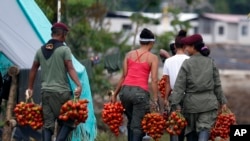Armed with an AK-47, Gladis was expected to fight on the frontline alongside her FARC guerrilla comrades, hoist heavy loads and stand guard, just as the men in rebel ranks did.
That's real gender equality, said 42-year-old Gladis who has fought with the Marxist rebel group, the Revolutionary Armed Forces of Colombia (FARC), for more than two decades.
"We are all equal here. Everyone is treated the same," said Gladis, at a mountaintop demobilization zone in northern Colombia where around 160 FARC fighters have gathered to disarm.
"Men respect us here. There's no machismo," she said.
Ending half a century of war, the FARC are handing in their weapons after signing a peace deal with the government last year. Women make up about a third of the 7,000 FARC fighters set to demobilize over the coming months.
The government, former rebels who deserted and rights groups have said gender inequality played out in the jungle as it did elsewhere, and women suffered abuse in FARC ranks, including forced abortions and being commanders' sex slaves.
But guerrilla life as told by six FARC women and two commanders interviewed by the Thomson Reuters Foundation in Colombia's northern mountains offers a different view, and the chance, rebels say, to counter false propaganda spread by their enemies.
Defying gender roles
Women rebels say they are not victims or sex objects and were not discriminated against because of their gender or race.
"I think taking up arms was the best decision I ever made," said Gladis, wearing a sparkly silver top. "I'm proud to be a guerrilla."
The FARC says its women fighters were treated as equals.
Women held important jobs, were appointed as commanders, and the FARC brought several women to the negotiating table during four-year long peace talks with the government.
Women were particularly sought after for intelligence gathering and radio communications, forming the backbone of guerrilla operations.
"The participation of women has been indispensable," said Solis Almeyda, a veteran FARC commander, who still uses his nom de guerre. "Women could go undetected when carrying out intelligence gathering."
Yet demobilized women guerrillas may struggle to enjoy such equality once they reintegrate into civilian life in a society known for its patriarchal and macho culture.
In parts of mainly rural Colombia, women are often viewed as child-bearers and are expected to stay at home.
"We hear women are paid less than men and that it's difficult for women to hold top positions," said 37-year-old Sara Narvaez, who has spent two decades in the FARC.
Women rebels point out that camp chores were equally shared.
"The men cook too. Everyone washes their own clothes here," said rebel fighter Adriana.
Women say they were given opportunities to learn skills, such as nursing and dentistry, which would have been off-limits to them in the rural communities they came from.
"I've learnt things I would never have had the opportunity to do," said Kelly Martinez, a 42-year-old FARC nurse, who performed first aid and amputations on wounded rebels.
"I feel valued and useful here," she said, wearing silver hooped earrings.
Abuse
But the perception of gender equality among the rebels is just a veneer, the government and rights groups have said.
In 2015, Colombia's attorney general said it was investigating 150 cases of former women guerrillas who had given testimonies saying they were forced to end their pregnancies.
The FARC deny forcing women and girls to undergo abortions and using women as sex slaves for commanders.
"Commanders don't choose women. Women are free to choose (their partners)," said Almeyda.
Still couples had to get prior approval from their commander before starting a relationship and be allowed to share a tent.
The government and rights groups have collected scores of testimonies from women, mostly from civilians living in areas once controlled by the FARC, that they were victims of sexual violence at the hands of rebel fighters - crimes FARC commander Almeyda denied.
As part of the peace accord, truth tribunals will begin later this year to uncover abuses committed by all sides in the war - likely to shed light on the extent to which rape was used as a weapon of war in Colombia.
Under the accord, women who have been raped by military forces or rebel fighters can expect to have the crimes against them investigated and the perpetrators punished.
"Rape was part of the propaganda used against us," Almeyda said. "Sexual violence was a crime (in the FARC)."
None of the women interviewed said they had heard of cases of sexual violence in rebel ranks.
Motherhood
With the fighting over, peace is allowing new freedoms and more women rebels are having children.
During the war, women had to use birth control, often contraceptive implants placed in the upper arm. Those who became pregnant, and who decided to go through with their pregnancy, had to leave their newborns with relatives.
Rebel fighter Margot became pregnant four years ago and gave birth to a son, Andres, in a guerrilla jungle camp.
"To hand over your child is very difficult. You cry for your child," said Margot, who left her son with her mother-in-law to look after when he was a month old.
Last month, she was reunited with her child, now aged three, and who lives in the demobilization zone with his parents.
"The commander sent for him a month ago and he's been here ever since. I'm teaching him how to read and write."
Camila Norma, who is four months pregnant, is also looking forward to raising her child in a new era of peace.
"My dream for my child is that he will have all the guarantees to an education," said Norma, 26, sporting red painted fingernails. "My dream is that he can become someone in his life."





